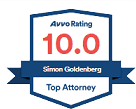WHAT IS COMPOUND INTEREST?
ANNUAL PERCENTAGE RATE (APR) VS. ANNUAL PERCENTAGE YIELD (APY)
Let's say you take a loan from a bank for $1000.00 with an Annual Percentage Rate (APR) of 20%.
At first, you might think that the interest that would be due at 1-year would be $200 (calculated at 20% of $1000). However, because the bank is compounding the interest, the interest that would be due at 1-year is greater. The actual amount of interest charged annually, inclusive of compounding, is referred to as the Annual Percentage Yield (APY). The APY is tremendously more relevant then the APR when calculating a loan repayment.
If the interest is compounded on a daily basis, the total amount due at 1-year is $12,213.36. The interest that would accrue during that year is $2,213.36. Essentially, in this situation, the compounding has caused an increase of $213.36 as compared to a loan at the same interest rate that does not compound interest.
A bank would earn an extra 10% in interest in the first year by applying this method of daily compounding.
WHAT IS THE DIFFERENCE BETWEEN APR VS. APY?
The terms APR, or annual percentage rate, and APY, or annual percentage yield, are thrown around a lot when borrowing or saving, but while they may only have one letter of difference in their acronyms, APR and APY are extremely different.
When banks are offering loans, the APR is a more attractive number to provide to consumers for the purposes of marketing. When a loan is subject to compounding, the APY will always be higher then the APR, because the APY reflects the true interest rate. Due to financial regulations, most banks must clearly disclose the annual percentage yield when advertising loans. The annual percentage rate is mostly relevant on a loan that is not subject to compounding of interest, which is quite rare when dealing with a lending institution.
HOW CAN COMPOUND INTEREST HURT YOU?
If interest compounds at an unanticipated rate, it is easy to become overwhelmed by the debt. Especially if a borrower has missed required payments, the compounding can further excerbate the issue by causing the entire debt to grow. The debt balance continues to grow larger over time, and consequently. as the amount you owe gets bigger, the interest that you owe will grow as well.
STOP THE VICSCIOUS CYCLE OF RAPID DEBT GROWTH
If you can’t afford to pay off the interest on your debt while still making payments on the amount that you borrowed, compound interest can make your debt grow very quickly. The attorneys at the Law Office of Simon Goldenberg, PLLC help New Yorkers find solutions to their debt problems. Contact us today to schedule a consultation with one of our experienced debt relief attorneys.
Call (888) 301-0584 for a free evaluation.











